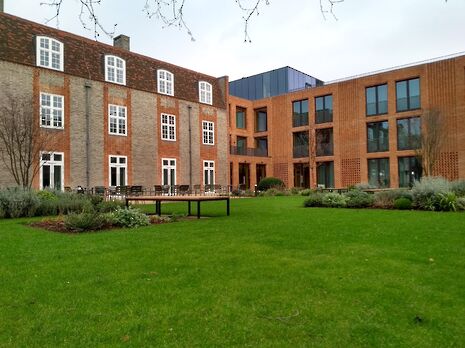Cambridge accommodation supposedly promotes ‘mindfulness’, but only for the few
Charley Barnard argues that accommodation is built more for conferences than student welfare, and the privilege of rooms that promote “wellbeing” is reserved for only a few students

A recent article in The Times praised Newnham College’s recently-opened Dororthy Garrod Building, which cost a reported £27M to build, reporting that the building is part of the University’s “mindful approach” which is “addressing the mental health of their students." Dame Carol Black, the College’s principal, said: “if you want to be proactive about good mental health you have to enable it”.
This stands in stark contrast to the findings of a survey carried out by Newnham Cut The Rent, where 36% of respondents said that the price of rent affected their ability to enjoy being at university. They cited reasons such as mental health, the guilt of a financial burden on parents, and the opportunity costs of high rent meaning that they had to stop doing extracurriculars they used to enjoy. And even when bursaries and subsidies are taken into the equation, the data shows that 25% of students in receipt of them feel that they make no difference to their ability to pay rent.
The accommodation only promotes wellbeing for those students with enough financial security
Articles like these only seem to highlight the disconnect between University PR and student reality. According to the piece in The Times, “Everything about the design of the building at Newnham, a women’s-only college, has wellbeing in mind.” This claim does not match up to student reality. Students are paying £160 a week (including the minimum amount of Kitchen Fixed Charge) across all accomodation, 9% higher than the Cambridge university average of £146.98/week, for rooms that vary wildly in quality. For example, the new building has double beds and floor to ceiling windows, while others, such as Old Hall, the building most in need of repairs and where 15 students living on the third floor share one kitchen and two toilets, has looked like this for the past four months:
This is not to mention that despite attempted negotiations from JCR international and welfare officers, students are not allowed to stay in the new building over the breaks, and the College has failed to guarantee that students living in this accommodation would be able to move to different rooms in college over these periods. Thus, only students with a termly licence — meaning that they go home during the holidays — can live in the new building, effectively excluding international students, homeless students, or students with precarious living situations. The accommodation only promotes wellbeing for those students with enough financial security to not have to worry about price, and who have a home to go back to over the breaks.
But what happens when we do go home? The rooms are straight on booking.com, for between eighty and one-hundred pounds a pop. Students have been finding this information when it shows up in suggested adverts, as there is yet to be any communication from college which would let people know that the pictures we are allowed to leave on pinboards and the books left on shelves may be seen or touched by anyone who books the room through the website. Newnham College isn’t the same as a hotel; when you book a hotel, you don’t know who else will be staying there, but when you book to stay at the College, you know you are guaranteed to be sharing a building with young women aged mostly between 18-21, a feature that I, perhaps cynically, believe will be abused. Tell me again that this accommodation promotes the wellbeing of students?
The marketisation of what should be our homes has led to the nicest rooms being built not for students but for conferences
Perhaps this is why the original article reads more like an advertisement for Newnham accommodation than an “investigation”. It heralds the new, brightly coloured “party room”, failing to mention that it is entirely unfit for purpose, with a 40-person capacity and a campaign by the ents officers to get it repainted literally anything other than electric blue.
This problem persists throughout the University, and students are left wondering where priorities lie. Students at Newnham may consider themselves lucky to even be allowed a place to stay over the breaks (even if they’re not allowed to stay in the swanky new build!), as out-of-term accommodation in other colleges is often few and far between, with most on-site rooms being saved for conferences, which are a big money-maker for the University.
The marketisation of what should be our homes has led to the nicest rooms being built not for students but for conferences, and the cheapest rooms being few in number and poor in quality. Testimonies last year demonstrated that Robinson College only had 4 “value” rooms, a number which has since increased thanks to the efforts of their JCR and Cut The Rent campaign, while students at Magdalene had to live with wasps’ nest in their rooms, and their nearest bathroom was across the road. The cheapest accommodation is often entirely unfit for those with accessibility needs, meaning that those with less money but a need for special adjustments have to pay out of pocket, an even greater burden since maintenance grants for the most financially-pinched students were abolished.
As access to Cambridge for those from disadvantaged backgrounds improves, accommodation needs to catch up: there needs to be enough cheap and accessible accommodation for those who need it, we need rooms available over the breaks, and the price and quality of rooms needs to promote wellbeing for all, not just the few who can afford the highest rents.
 News / SU reluctantly registers controversial women’s soc18 December 2025
News / SU reluctantly registers controversial women’s soc18 December 2025 News / CUP announces funding scheme for under-represented academics19 December 2025
News / CUP announces funding scheme for under-represented academics19 December 2025 Features / Should I stay or should I go? Cambridge students and alumni reflect on how their memories stay with them15 December 2025
Features / Should I stay or should I go? Cambridge students and alumni reflect on how their memories stay with them15 December 2025 Fashion / The art of the formal outfit 18 December 2025
Fashion / The art of the formal outfit 18 December 2025 News / Dons warn PM about Vet School closure16 December 2025
News / Dons warn PM about Vet School closure16 December 2025










